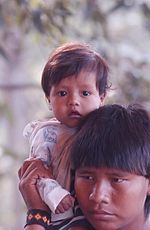Sphaenorhynchus botocudo is a frog in the family Hylidae endemic to Brazil. The adult male frog measures 23.9-29.3 mm in snout-vent length. It has a black...
2 KB (145 words) - 09:25, 25 January 2024
Glanidium botocudo is a species of driftwood catfish in the family Auchenipteridae. It is found in coastal rivers systems, such as the Rio Doce and the...
2 KB (134 words) - 22:32, 13 April 2024
Botocudo modestus is a species of dirt-colored seed bug in the family Rhyparochromidae. It is found in North America. "Botocudo modestus Report". Integrated...
1 KB (70 words) - 21:52, 2 January 2024
genus Botocudo: Botocudo aethiops (Distant, W.L., 1904) c g Botocudo ashanti Southwood, 1963 c g Botocudo assimulans (Bergroth, E., 1918) c g Botocudo cavernicola...
5 KB (361 words) - 21:52, 2 January 2024
The Xokleng or Aweikoma (sometimes called botocudos) are a Native American tribe of Brazil; their territory is located mainly in the state of Santa Catarina...
2 KB (72 words) - 02:13, 13 July 2024
Coroados Botocudos Xavantes Kaingang Karajá Bororo Rikbaktsa Pataxó Camaçan Tapuia Puris...
2 KB (99 words) - 13:29, 4 October 2024
Brazil 1889–present The region of Rio was inhabited by the Tupi, Puri, Botocudo and Maxakalí peoples. Europeans first encountered Guanabara Bay on 1 January...
230 KB (20,510 words) - 23:49, 6 October 2024
Krenak languages (redirect from Botocudo language)
known, include Ankwet (Anquet) and Xónvúgn (Chonvugn). Mason (1950) lists: Botocudo (Aimboee, Borun) Araná (Aranya) Crecmun Chonvugn (Crenak) Gueren Gutucrac:...
10 KB (841 words) - 20:42, 28 August 2023
several decades ago) The Suyá men of Brazil (most no longer wear plates) The Botocudo of coastal Brazil (in previous centuries, both sexes wore plates) Aleut...
13 KB (1,443 words) - 01:39, 6 August 2024






